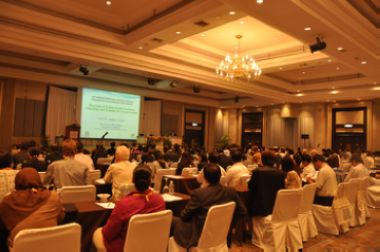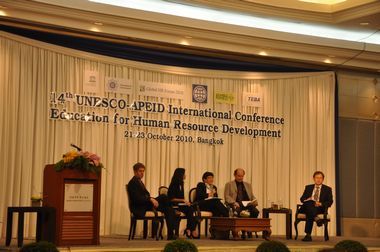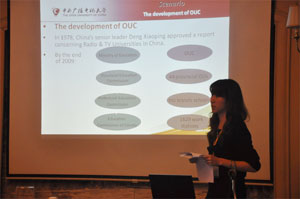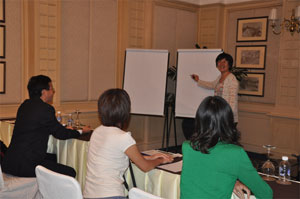 The 14th UNESCO-APEID International Conference took place from 21 to 23 October, 2010 in Bangkok, Thailand. Around 170 participants attended, and over 90 speakers presented their papers. Wang Ying, an associate professor at the Institute of Open and Distance Education of the Open University of China(OUC), and Dai Jing, a member of the OUC's International Cooperation and Exchange Division, participated in the conference on behalf of the OUC.
The 14th UNESCO-APEID International Conference took place from 21 to 23 October, 2010 in Bangkok, Thailand. Around 170 participants attended, and over 90 speakers presented their papers. Wang Ying, an associate professor at the Institute of Open and Distance Education of the Open University of China(OUC), and Dai Jing, a member of the OUC's International Cooperation and Exchange Division, participated in the conference on behalf of the OUC.

Plenary Session of UNESCO-APEID International Conference
Under the theme of "Education for Human Resource Development", the conference divided paper-related issues into three key questions. Firstly, what are the knowledge, skills, competencies and values needed for the 21st century, which should be the focus of human resources? Secondly, what different paths can be taken to obtain these goals? And thirdly, what kinds of policies, both at national and lower levels, can be implemented to support education and training in human resources development?

The Third Plenary Session presented as a "Talk Show" chaired by Molly Lee (centre)
The conference included four plenary sessions and five concurrent sessions. Wang Ying and Dai Jing respectively presented their papers in concurrent sessions. Wang's article, Living Skills of Potential Young Migrants: A Study on Current Situation and Educational Training, presented the findings of the project of Rural Young Migrants Employment Status Investigation and Education Policy Analysis, which was supported by the National Office For Education Sciences Planning of the Ministry of Education. Dai promoted the OUC's recent contribution to the development of open and distance education (ODE) and human resources in her paper The Role of Open and Distance Education in Human Resources Development in China: A Case Study of the Open University of China.


Dai Jing and Wang Ying giving their presentations
During the conference, speakers and those presenting papers shared their rich experience in linking theory and practice. Ministers, policy makers, educators, teachers, academics, researchers, representatives of the private sector, youth groups and the World Bank exchanged information and learned from each other on how to develop and optimize our human capital to meet the challenges of the 21st century. A Ministerial Round-Table was also held in conjunction with the conference, where ministers and high-level officials from 11 countries in the Asia-Pacific and Arab regions met and discussed educational and human resource development issues of mutual interest.
If you wish to download papers and powerpoint presentations, please view the website of the 14th UNESCO-APEID International Conference.
By Dai Jing, the OUC